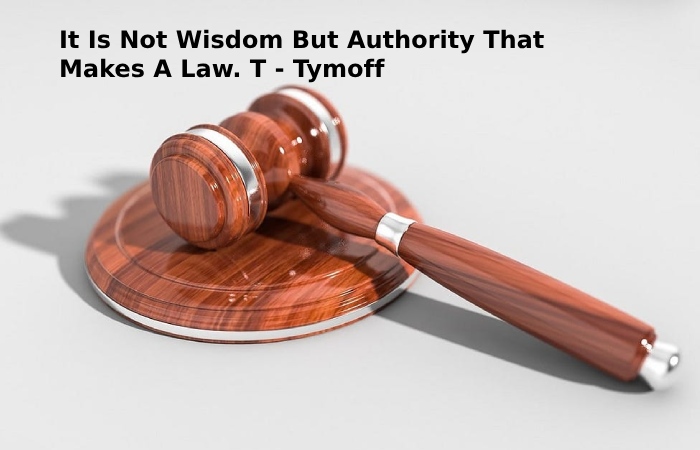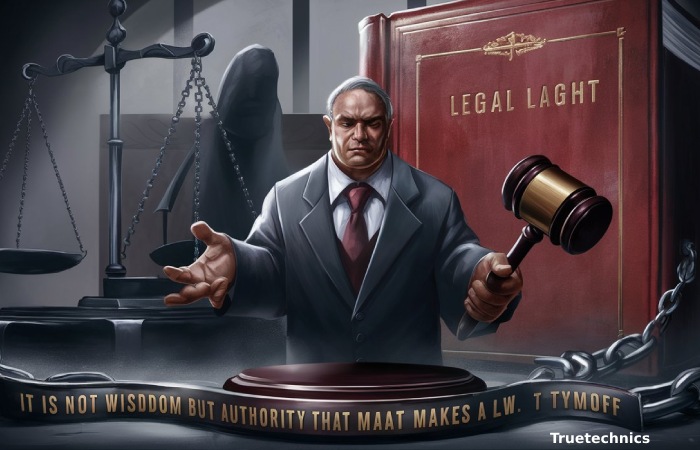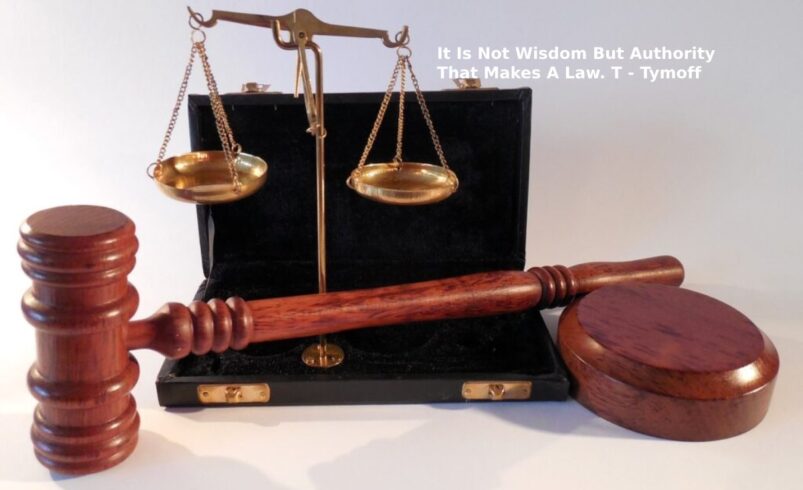The surprising idea behind legal systems is that “It Is Not Wisdom But Authority That Makes A Law. T – Tymoff” comes from. This comment questions the common belief that rules should be based on information, morals, and logic. It says that authority is the real power that makes rules and ensures they are followed. To fully understand this point of view, we need to look into how wisdom and power work in legal systems.
Intellectuals like Thomas Hobbes also agreed with this point of view. They said that laws are only morally right because they are enforced by a supreme power, not because the rules are moral. The quote, “It Is Not Wisdom But Authority That Makes A Law. T – Tymoff”, makes us think about how laws are made and how authority ensures people follow them. Read on to know more.

It Is Not Wisdom But Authority That Makes A Law. T – Tymoff
To make competent government and well-thought-out laws, we need to find new ways to balance power and understanding when making laws. Getting more people to vote will help close this gap. People are more likely to take part in making laws when they are open and easy to understand. This means they bring a more comprehensive range of opinions and knowledge. People can be held responsible in many helpful ways. The ones that come to mind are public hearings, feedback loops, and effect evaluations.
More people from different backgrounds in legislative groups can also help the process by adding their experiences and points of view. This can help make the laws more fair and intelligent. Thoughtful debate is better than hasty decisions when creating rules that combine power and knowledge and work better overall. We can build a legal system that respects both the power of law and the power of knowledge to teach by working towards these goals. This is good for everyone’s health, justice, and fairness.
How Legal Authority It Is Not Wisdom But Authority That Makes A Law. T – Tymoff Works?
Power is the most essential part of our law system. In most societies, power comes from a constitution, rules, or most people living there. That means they allow governments to make rules that tell everyone how to behave. Laws become rules that people must follow, and there are real penalties for breaking them when they are broken.
The idea is essential because it’s what the whole legal system is built on. It lets the government punish people, get taxes from them, and decide what they can and can’t do. Rules and laws are essential but often cause arguments, especially when discussing moral and social problems. Without this vital part, the whole system of law and order could fall apart. This shows how important power is in all legal systems around the world.

Meaning: It Is Not Wisdom But Authority That Makes A Law. T – Tymoff
When I first read the quote, “It is not wisdom but authority that makes a law,” it hit me that laws become their power from the authority of those who make and support them, not from their wisdom or reason. This made me think more deeply about what authority is, what role wisdom plays in running a country, and how rules are made and followed.
Understanding Its Legitimacy And Authority
In government, specialists are the power given to persons or groups to keep the peace, shadow the rules, and make choices. Legitimacy is the impression that people in power have a good aim for being in charge. This power is linked to legitimacy. Over the years, we’ve seen many kinds of power, from kings and tyrants to leaders picked by the people. No matter what type, power is necessary to keep society stable and ensure people follow the rules.
Wisdom In Making Laws: A Goal That Is Rarely Reached
Regarding rules, urgent issues usually take precedence over good sense. What people think is brilliant is very different. It is hard to turn pure knowledge into rules since politics often gets in the way. What people decide is affected by their party, social forces, and money worries. People who make rules now must think about short-term problems instead of long-term facts. Lawmakers have a lot on their plates, so it’s hard for them to write rules that everyone agrees are fair. Many different goals that often clash make it harder to make intelligent rules.
Legislative Power and Authority: How They Work?
A confusing picture emerges when we examine how authority and power work in politics. Power often changes the people who have it and ensures they follow the rules. Power can be gained in many ways, such as through money, society, or ties in the government. Laws can be changed to help some groups more than the general good when people have this much power.
The rules would show how moral and intelligent everyone is if the world were perfect. Still, they often do what the powerful want. It’s even more important to check how people use their power now. Also, this will help ensure that rules are made using a fair method that works for everyone.
Case Studies: Power vs. Knowledge
In the past, there were many times when power got in the way of making rules make sense. One case of this is the Jim Crow laws in the United States. These rubrics, which state and local governments shaped, didn’t consider fairness and justice. They made it so that people of different races had to live apart and were poorly treated.
Laws against sodomy, which made relationships between LGBTQ people criminal based on morals instead of human rights, are another example. In the same way, the war on drugs led to strict drug laws that put penalties ahead of health. These examples show that rules made by influential people can be unfair and harmful if they are not based on good sense.
Conclusion
Statute-based rules are usually driven by power, so we shouldn’t follow them unthinkingly. Instead, we should consider the deep understanding laws are based on. Laws are not made by wise people but by people with power. t for “tymoff.” The quote shows how fundamental and straightforward the contradictions are in law systems. To understand how hard it is to make laws, you must know the apparent and hidden differences.
Also Read: Isaimini VIP – The Best Site to Find Tamil Movies Online


